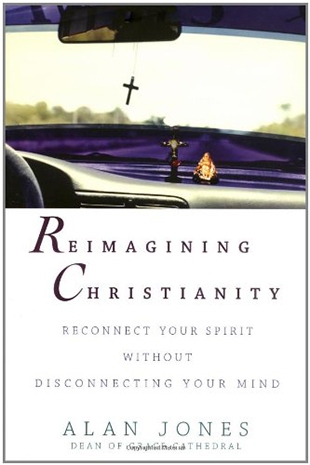"We interpret the world and understand ourselves via images and stories. When the faculty to imagine gets wounded or diseased, we find ourselves caught in destructive fantasies from which there appears no escape. Fear of the unknown or unfamiliar takes over, with destructive and malevolent results. To make matters worse, the culture bombards us with ready-made images falsely promising fulfillment and happiness. No wonder so many of us are depressed. The basic image of our culture is that we are consumers. The basic image of the great religious traditions is that we are related — connected to each other, to the world, and to God.
"Central to the task of reimagining Christianity — or imagining how any faith can begin to live up to its promise — is putting the creative energy of the imagination to work discovering and building bonds between neighbors. We need to bring every watt of imaginative power we possess to this task, because the barriers to overcome are so formidable and the stakes so high.
"Part of the challenge in this is that we tend not to trust the power of our imagination. And our imaginations are often wounded, crippled by personal experience and/or cultural damage. We like the controlled fantasy of the movies, but we don't trust the freewheeling imagination because it gets out of hand, and we like to be in control. It's one thing to be scared out of your skull sitting on a sofa with a couple of friends watching a horror movie. It's quite another to reel in terror when you realize that the imagination can build or destroy the world where you live. That's why we tend to disable the imagination and sabotage its subversive healing work. We think of it as a monster lurking in our depths that must be kept in chains. That's why some fundamentalists want to burn books or ban fantasy. Fantasy is not literally true, such thinking goes, and what isn't literally true is a lie and should be labeled as such. The imagination survives such attempts at self-crippling, but it often reasserts itself in violent ways. Something we had long suppressed and forgotten erupts from our depths. The beast escapes; images emerge that frighten us or that do incalculable harm in the hands of unscrupulous or unconscious people.
"Being open to the imagination is an art. How do we deal with the monsters and mysteries that come up, unbidden, from the depths and learn to treat them as images and not as directives? They should be neither suppressed nor acted on. We are to consider them with an artist's judgment and not an idolater's compliance.
"The imagination isn't always benign. It needs healing and regulating. It can be seductive and destructive. The imagination gets diseased when fear of outsiders takes over. History has many examples of political leaders who used metaphors such as 'cancer' or 'vermin' to describe elements in society they wished to suppress or eliminate. . . .
"The work of the imagination is serious business because through it we build or destroy the world. We've already imagined that everyone on the planet is a neighbor rather than merely a rival consumer. Imagining that we are guests and hosts of each other, not rivals or vandals, would mean working for a more just and genuine neighborly society in which each person was truly valued and therefore not open to becoming a vandal or a terrorist. Even those who surrender to a destructive imagination are guests in this house of being they have not personally built.
"It takes real imaginative work to see others not merely as unthreatening but also as possible sources of celebration and revelation. George Steiner reminds me of the importance of sheer hospitality and respect in many traditions:
" 'Trees have roots, men and women have legs, with which to traverse the barbed-wire idiocy of frontiers, with which to visit, to dwell among mankind as guests. There is a fundamental implication to the legends, numerous in the Bible, but also in Greek and other mythologies, of the stranger at the door, of the visitor who knocks at the gate at sundown after his or her journey. In fables, this knock is often that of a concealed god or divine emissary testing our welcome. I would want to think of these visitors as the truly human beings we must try to become if we are to survive at all.'
"The truly human is the stranger at the door — a divine emissary, an angel — our neighbor. The guest master at a monastery in Egypt once greeted me 'as an angel of God — just in case!' It's not a bad image to help us greet everyone we meet — just in case they have something to teach us, or a message we need to hear. Without such an act of imagination we miss the risk and the hope of being connected to others.
"Andrew Solomon sees an analogy between the epidemic of depression and the environmental movement. In some way we are doing to ourselves what we're doing to the ozone layer. One neighborly act would be to 'start doing small things now to lower the level of socioemotional pollution.' Solomon writes, 'We must look for faith (in anything: God or the self or other people or politics or beauty or just about anything else) and structure.' Faith in anything? Solomon qualifies this by implying that he means anything that calls us to imaginative acts of love and compassion. We are to 'help the disenfranchised whose suffering undermines the world's joy.' And saving the ozone layer and the rain forests is directly connected with saving ourselves."
